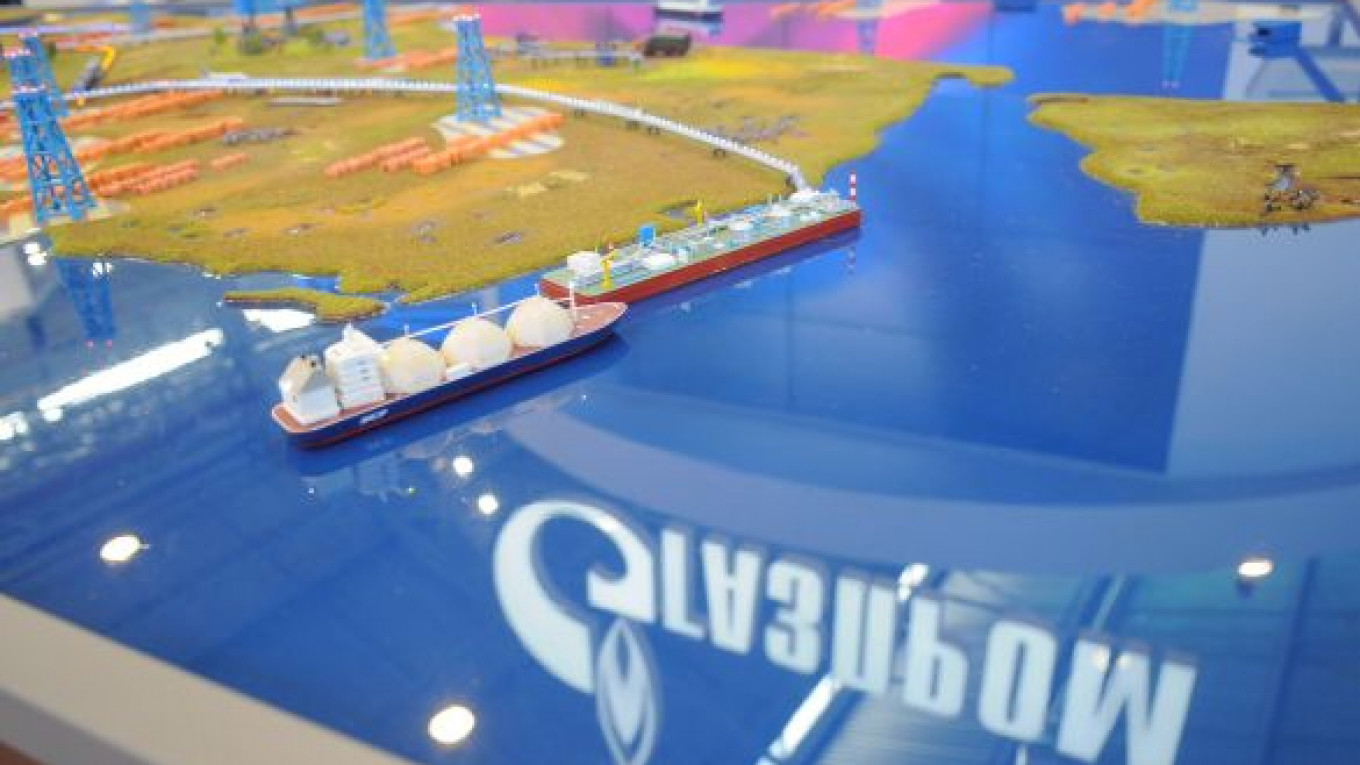Prime Minister Vladimir Putin’s plan to make Russia a global supplier of gas is being undermined by Gazprom’s project delays as Australia wins China contracts and U.S. supply surges.
Gazprom has put off investment decisions for liquefied natural gas projects, such as its Arctic Shtokman field. It has spent six years and counting to ponder an expansion to the $22 billion Sakhalin-2 project, Russia’s first LNG plant that started up last year.
As Russia delays, Exxon Mobil, Chevron and competing suppliers are locking up long-term deals with PetroChina from LNG projects in Australia and Southeast Asia. Royal Dutch Shell, Gazprom’s partner in Sakhalin, is seeking to expand developments to win a share of markets in China and India. It may be already too late, said Mikhail Korchemkin at East European Gas Analysis.
“The LNG market is developing too fast for Gazprom to catch up,” said Korchemkin, managing director at the consultancy. “Gazprom should rather worry about keeping its share in the European market.”
While Gazprom, the world's biggest gas producer, supplies about a quarter of Europe’s gas needs, it has lost market share to Norway and Qatar, in part as LNG shipments to Europe rose 22 percent last year.
Shares in Gazprom have fallen 9 percent this year, compared with an 8 percent decline in the Bloomberg Europe Gas Index. Of 18 analysts tracking Gazprom, 16 rate it a “buy.”
Russia targets 25 percent of the world LNG market by mainly developing gas fields at Sakhalin-2, Shtokman and the Yamal Peninsula. In September, Putin hosted a meeting with heads of global energy companies to attract investment in Yamal, which means “end of the world” in the local Nenets language.
“There’s no chance of Gazprom getting 25 percent of the world LNG market,” said Keith Bainbridge, a partner in charge of gas at RS Platou in London, an offshore and shipping broker and investment bank. “LNG is now a global business.”
Gazprom would be better looking at buying an Australian project, Total’s stake in a Yemen venture, or maybe bid for BP’s Tangguh LNG plant in Indonesia, given BP’s woes in the Gulf of Mexico, he said.
Gazprom plans to participate in LNG projects in the Middle East, Africa and Latin America, the company said in a response to questions, without giving further details.
It will need to compete for customers with Australia’s $37 billion Gorgon LNG project being developed by Chevron with Exxon and Shell. PetroChina agreed in August to buy 2.25 million tons annually from 2014, a contract worth about 50 billion Australian dollars ($44 billion).
In Papua New Guinea, Exxon is leading a $15 billion project, one of more than a dozen in the region targeting Asian buyers.
“Gazprom has ambitions, but competition and demand dynamics may have a significant impact on plans for presence in the U.S., the share of the European market and LNG sales,” Troika Dialog analyst Valery Nesterov said. “It will be very difficult to break into the market.”
Delays may cost Gazprom as much as $12 billion a year in missed sales of about 40 million tons of LNG, Nesterov estimates.
Global trade in LNG is growing as countries switch to cleaner-burning fuels to replace coal and oil. Technology developed about 40 years ago enabled the cooling of natural gas to a liquid for shipment by sea, opening up markets around the world that could not be reached by pipeline.
World LNG shipments rose 6 percent to 182 million tons in 2009, according to the International Group of Liquefied Natural Gas Importers.
Japan bought 35 percent of supply and South Korea 14 percent, the group said. China imported 3 percent of the total after purchases surged 70 percent. Production capacity is set to grow by more than 50 percent by 2013, the International Energy Agency said in June.
LNG exports from Australia rose 19 percent last year to 18 million tons. Qatar shipped 37 million tons, Malaysia 23 million tons and Indonesia 19 million tons.
Russia entered the LNG market with Sakhalin-2, which has capacity of 9.6 million tons a year. It exported 5 million tons of LNG last year, according to the importers’ group.
Gazprom’s chief executive Alexei Miller said in February 2009 that the company would spend $45 billion to raise output of LNG to about 90 million tons a year by 2030.
Beside the competition Gazprom faces, increased LNG output and supply of U.S. shale gas extracted from rock have pushed down global gas prices. Benchmark U.S. gas prices have slumped 14 percent this year, following declines in the previous two years.
Against falling prices and more capacity coming online, Gazprom argues that there will be demand for its LNG in the market.
“Qatar has a moratorium for new LNG capacity construction until 2014, while production costs at mainly offshore projects in Australia are quite high,” Gazprom said in a response to e-mailed questions. New LNG importers such as Singapore and the Middle East will mean that there will be “enough room for everyone,” the company said.
A Message from The Moscow Times:
Dear readers,
We are facing unprecedented challenges. Russia's Prosecutor General's Office has designated The Moscow Times as an "undesirable" organization, criminalizing our work and putting our staff at risk of prosecution. This follows our earlier unjust labeling as a "foreign agent."
These actions are direct attempts to silence independent journalism in Russia. The authorities claim our work "discredits the decisions of the Russian leadership." We see things differently: we strive to provide accurate, unbiased reporting on Russia.
We, the journalists of The Moscow Times, refuse to be silenced. But to continue our work, we need your help.
Your support, no matter how small, makes a world of difference. If you can, please support us monthly starting from just $2. It's quick to set up, and every contribution makes a significant impact.
By supporting The Moscow Times, you're defending open, independent journalism in the face of repression. Thank you for standing with us.
Remind me later.






